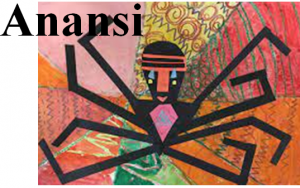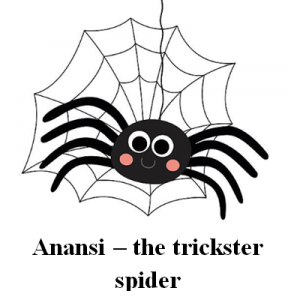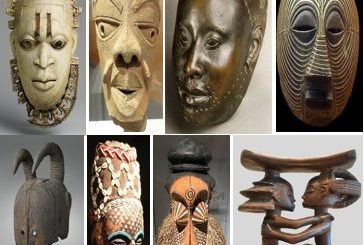Anansi – the Trickster Spider-Man of West Africa
In the beginning, the world was much different from the one we have today. Sky god Nyame (also known as Nyankonpon) selfishly hoarded all the stories of the world. The lives of the people were colorless and boring as there were no stories to entertain the people. It also meant that there were no stories to convey the people’s history, a vital part of any culture.
According to the myths, the all-seeing sky god’s goal was to control all the people on earth by depriving them of the joy of stories. However, there was one individual who resisted. Anansi, the trickster spider-man, spawned his web toward the sky and without any form of trepidation approached the golden stole of Nyame. The small little creature had gone to bargain with the almighty Nyame for the stories of the world.
Read on to discover how Anansi used his wits and cunning to bring stories to mankind. It also includes many other tales involving Anansi and how he was able to outwit individuals, creatures, and gods far more powerful and greater than him.
But first we take an in-depth look at who Anansi is, his origin story, and how he became an important folktale character in West Africa, the Caribbean and many African-American communities in the United States.
Who is Anansi?
Tales of Anansi, also known as Kwaku Anansi, originated in West Africa, to be more specific among the Akan ethnic group who primarily live in present-day Ghana and some parts of the Ivory Coast.
In the myths and folktales, Anansi is depicted as a spider or a hybrid creature – that is, half man and half spider. In the best-known story, Anansi is the son of Nyame, the all-powerful and all-seeing sky god.
A trickster and the god of wisdom
In Akan religion, Anansi is sometimes portrayed as the hero of the people, a benevolent and wise trickster who transformed the world. Some Akan tribes believe that Anansi is deity or in some cases a minor deity (i.e. abosom). In other words, Anansi is represented in almost the same manner as the Orishas in Yoruba religion and the vodun in Haiti and Jamaica. In the Akan pantheon of gods, Anansi is associated with wisdom. Therefore, his equivalent in the Greek pantheon is most likely the trickster Titan Prometheus.
Read More: Top 12 Orishas in Yoruba Religion
Anansi’s character
In the stories about Anansi, the trickster spider is most known for his shrewdness, good looks as well as his self-serving behavior. A good looking creature, Anansi carried himself as an easy going non-threatening creature. But do not be deceived, for beneath all that sweet talk and smile was a creature that was perhaps the deadliest in his world. He has a knack of combining cunningness with a deceptive touch of naivete. The latter trait of his is intended to let his opponents let their guards down.
As we shall see in the stories below, Anansi is never hesitant to pounce on people that fall for his seductive words. No one – be it mortal or god – was impervious to this creature’s cunning.
However, there are some folktales that often portrayed Anansi as a protagonist because his actions end up bringing the people of the world valuable gifts.
Meaning of Anansi’s name

As a result of his superior intellect and wit, Anansi could easily bring down the fiercest and mightiest of creatures in the forest.
Anansi’s name in the Akan language literally means spider. In many of those Akan tribes, his name also evokes a sense of mischief or cunningness. The name could also carry a positive connotation. It’s been used to refer to someone who is skilled or wise. The Akans, particularly the Twi-speaking Akans in Kumasi, Ghana, sometimes use Anansi’s name to refer to a sweet talker or someone skilled at giving speeches that are intended to deceive people.
Originally known as Kwaku Anansi in Ghana and the Ivory Coast, Anansi’s name has undergone many slight changes, as we shall see below.
Among many Akan people in West Africa, children are named after the day of the week on which they were born. Every name attached to the seven days of the week carries a meaning. For example, Sunday male and female children are named Kwasi (or Akwasi) and Akosua (or Esi) respectively. For example, the first president of Ghana, Kwame Nkrumah (1909-1972), was named Kwame because he was born on a Saturday. Then, there is Kofi Annan (1938-2018), the seventh Secretary-General of the United Nations, was so named for being born on a Friday.
In the case of Kwaku Anansi, the Akans believed that the spider god was born on Wednesday. The name is often associated with stubbornness.

Anansi is popularly known as Kwaku Anansi in the Akan language. Kwaku is the name given to males born on Wednesday. The females are known as Akua
Depictions of Anansi
With his name literally meaning spider in Akan language, Anansi is generally depicted as a spider. In some cases, he appears as a spider with the head of a man, while in others, he is shown as a half man half spider creature. This means that he is usually shown with eight legs, a feature that made him even more nimble and evasive whenever he was pursued by creatures far stronger than himself.
Family
It’s commonly stated in the folktales of Anansi that the spider creature is the son of sky-god Nyame. If that were the case, then Anansi’s mother will be the earth goddess Asase Yaa. This will also mean that Anansi’s siblings include deities like Bia, Tano, Apo, and Bosomtwe.
In the myths and folktales, Anansi is married to an industrious and very faithful mortal woman called Okonore Yaa. A Thursday-born, Okonore Yaa is associated with the Earth. This explains why she is often depicted toiling endlessly on the farm, while Anansi looks for every excuse in the book to avoid helping out. In some accounts and some regions of the Akan tribe, Anansi’s wife is also known as Aso. And in countries outside West Africa, she has been called Shi Maria.
By Okonore Yaa, Anansi fathered a number of children, including Ntikuma, his firstborn son, who is often depicted as the wisest of his siblings. His other children are Tikelenkelen (the big-headed one), Nankonhwea (the child with lanky legs and elongated neck), and Afudohwedohwe (the pot-bellied one).
According to some Ghanaian mythographers and writers, the beautiful young woman Anansewa is the daughter of Anansi. In some versions of the tales, Anansi infamously dupes unsuspecting suitors of huge sums of money by promising to give Anansewa’s hand in marriage. In The Marriage of Anansewa (1975), a play by famous Ghanaian playwright and dramatist Efua Sutherland, Anansi makes it his sole objective in getting the best suitor for his beloved daughter Anansewa.
Comparisons between Anansi and Odin
It’s worth pointing out that Wednesday was also the day of the Norse god Odin, a god who was also a trickster in his own right. As a matter of fact, the English word ‘Wednesday’ traces its roots to Odin’s name.
In Norse mythology, Odin’s appetite for trickery is perhaps only matched by the trickster god Loki.
The odds of two cultures several thousands of miles apart from each other having their respective trickster deities born on the same day is really mind-blowing.
Read More: 10 major myths about Odin, the all father god in Norse mythology
Anansesem – Spider Tales
In the Akan tribe, Anansi’s name is used to refer to the whole category of folktales or oral stories. In other words, what we refer to as fairy tales in the West, the Akans, use the term anansesem (“Anansi stories” or “spider tales”). This is testimony to just how significant the character is to the Akans and many other West African tribes. It’s often the case that not one single child in Ghana grows up without listening to one form of Anansesem in one shape or the other. After all, it was through the efforts of Anansi that stories came to be known to mankind.
Anansi and Nyame, the all father and all-seeing Lord of the Sky

By keeping all the stories of the world to himself, Nyame, the Lord of the Sky, doomed the inhabitants of the world at the time. Image: Adinkra Symbol: Gye Nyame
As stated in the introduction, Anansi, the cunning shape-shifting spider god, had grown fed up with a world where people could not bask by the fireside and enjoy any kind of story. The spider was also well aware of the countless heroes that had approached Nyame’s golden palace and failed in convincing Nyame to let go a bit of the stockpile of stories that was buried in the sky. Many of those heroes were far stronger and mightier than Anansi. Therefore what could a puny creature like Anansi do differently? Well, Anansi was no ordinary creature.
How Anansi became the owner of all the world’s stories
With no nervousness, Ananse approached the Nyame. He knew that he thred carefully and be mindful of his words, as Nyame was an all-knowing deity who would sense the slightest trickery. Anansi stared Nyame in the face and told him that he wanted to buy Nyame’s stockpile of stories. Stunned by the spider’s bravery, Nyame calmly told Anansi that he could not meet the steep price tag. Anansi then calmly vowed to pay whatever price Nyame put on the stories.
In exchange for the stories, Nyame demanded that Anansi fetch four of the most dangerous animals in the world. Nyame asked Anansi to bring him Onini the Python, Mmoboro the Hornets, Osebo the Leopard, and the Fairy Mmoatia. Upon hearing Nyame’s price for the stories, Anansi quickly accepted the offer. In some accounts of the story, Nyame also demanded that Anansi brings his own mother Ya Nsia for extra measure.
To catch his first target, Onini the Python, Anansi shows just how wits could trump brawn. With his powerful jaws and very poisonous bite, Onini was said to be one of the mightiest of creatures in the forest. No one dared approach Onini. After a quick consultation with his wife Aso, Anansi devised a plan. He cut a very long branch of a palm tree and then made his way to Onini’s lair. When he was a few feet away the lair, he started arguing with his wife about which was longer: the palm branch or Onini. Upon hearing their argument, Onini emerged and asked the couple why they were arguing. Anansi told Onini that his wife believed that the palm branch was longer than Onini. To resolve the debate, Anansi asked Onini if he could lie beside the branch so they could determine which was longer. Completely unaware of the ruse, Onini was eager to help resolve the debate. As Onini stretched beside the branch, Anansi brought out his strong vines and quickly tied the mighty python to the branch. The bait had worked, and Onini had been captured. Anansi sent the python to Nyame, who upon seeing the fetch was stunned.
To catch Osebo the Leopard, Aso advised Anansi to dig a big hole in the forest and cover it with shrubs. As the pit was dug at a place where Osebo frequented, Anansi was confident of finding Osebo trapped in the pit. The following day, Anansi went to the pit and just as he had expected saw Osebo trapped in there. Anansi pretended to be shocked by the misfortune of Osebo. He offered to help Osebo out of the pit provided Osebo did not pounce on him once he was free. The two creatures agreed, and Anansi threw a rope down into the pit so Osebo could climb out. Once out, Anansi jabbed the hilt of his knife towards Osebo, causing the mighty creature to fall on his back. Anansi then quickly spawned his webs to tie Osebo up. With a huge grin on his face, Anansi carried Osebo away and presented him to the sky-god.
Pleased by his first and second labors, Anansi set out to forest to trap Mmoboro the Hornets. Again, he solicits for the advice of his wife Aso, who tells him to get a calabash (a gourd-like container) and fill it with water. Anansi the ventured into the forests, to where Mmoboro lived. But before he reached the Hornets’ nest, he poured water on himself so as to give the Hornets the impression that it is raining heavily. As he approached the Hornets he placed the banana leaf over his head, further reinforcing the lie that it was raining. He then told the Hornets to fly into his calabash as because the approaching rain was very severe. Not sensing any kind of trickery, the Hornets thanked the spider and immediately flew into Anansi’s calabash. No sooner had the Hornets entered the calabash than did Anansi corked the calabash. He then presented the Hornets to Nyame.
In his final labor, Anansi had to be again at his sharpest as Mmotia the Fairy was an elusive and light-footed forest spirit that was hardly seen by anyone. The cunning spider carved a magnificent doll and then covered the doll with a lot of tree sap. Anansi then placed sap-covered doll in front of an odum tree that was rumored to Mmotia’s favorite spot. He then hid himself in a nearby shrub, waiting patiently for Mmotia. When Mmotia came upon the doll, she spoke to it, but the doll did not reply. Furious by the doll’s silence, Mmotia proceeded to strike the doll, but instead both her hands got glued to the doll. Further enraged by the doll’s continued silence, Mmotia tried to shove the doll away with her body, and this time around, her whole body got stuck to the doll. Anansi then came out of his hiding place and used his webs to quickly wrap Mmotia up. He scooped his prize into his bag and made his way into the clouds to present Mmotia to the sky-god.
Having accomplished all four labors, Anansi is said to have impressed the Sky-god, who then pronounced Anansi the owner of all the stories in the world. Anansi received the stories with the full blessings of the Sky god. With a huge grin and the feeling of accomplishment, Anansi descended down to earth to scatter the stories throughout the world. He entreated the people to share the stories.
The popularity of Anansi and his tales across the world
Folktales about spider are prevalent in many West African countries. His stories gradually made their way from Ghana to other parts of the world – particularly in the Caribbean, Europe and the Americas – during the Transatlantic Slave Trade era. The millions of slaves that were inhumanely shipped from the coast of West Africa brought to the New World the stories and tales of Anansi that they were told as children.
To many of those enslaved people taken from Africa, Anansi and his stories (Anansesem) were seen as the only thing that connected them to the motherland, i.e. Africa. They used those stories to keep mind and body together after a long and arduous day slaving on the plantation fields. In time, those stories were told to their children’s children. And with every Anansi tale that was told, those enslaved people dreamed of one day breaking free from the strong grip of the oppressor. Those stories steadily became a potent symbol of resisting the slave holder’s whips. It encouraged enslaved Africans in the Americas to emulate Anansi and use wits instead of brawn. Anansi tales are also credited with giving African Americans, many of whom felt like the Israelites in the Bible that were lost in the desert for several years, a sense of identity. And in an environment that was anything but extremely hostile to Blacks, no harm could come from having a strong sense of identity.
Today, Anansi tales are huge in many Black communities across our nation. They are also particularly famous in countries like Jamaica, Trinidad and Tobago, the Bahamas, Haiti, and Grenada. Every place that Anansi tale goes to, the people adapt him to suit their environment. For example, his name changes slightly. In Jamaica and Haiti, he is known as Annancy (or Brer Anansi) and Gede Zariyen respectively. The inhabitants of the Bahamas call him Anansi Drew.
In some cases, his gender is even reversed. In South Carolina, for example, the shape shifting spider is known as Aunt Nancy or Sis’ Nancy.
A story, a story; let it come, let it go
Before every tale or Anansesem is told, the Akans often begin by saying, “We do not really mean, we do not really mean that what we are about to say is true. A story, a story; let it come, let it go.”
Once the story has ended, the story teller utters these words: “This is my story that I have related. If it be sweet, or if it be not sweet, take some elsewhere, and let some come back to me” (“Manansesɛm yi a metoeɛ yi sɛ ɛɛdɛ oo sɛ ɛnnyɛ dɛ ooo,ɛbi nkɔ na ɛbi mmra”).

Anansi meaning and facts | Anansi’s character and his stories hold a special place in the culture of not just Akans in Ghana, but in many other West African tribes and the African diaspora.
The significance of Anansi being a trickster
What Anansi didn’t have in physical strength he made up for with his very sharp reasoning prowess. As stated above, Anansi was sometimes represented by the Akans (i.e. a West African ethnic group of people who reside in Ghana and some parts of the Ivory Coast) as the god of wisdom. Above all, he was a trickster god, a very good one for that matter.
As can be seen in many mythologies and folktales across the world, one underestimates a trickster god at their peril. Tricksters such as Loki (in Norse Mythology), Prometheus (in Greek mythology) and even Hermes (in Greek mythology) were a force huge transformation in their respective worlds. It’s not all the time that those changes ended up being beneficial so to speak. Loki, for example, was directly responsible for Ragnarok (i.e. the end of the world and the demise of the Norse gods). And the fire Prometheus had gifted to mankind to better themselves was used to forge weapons, which in turn caused endless wars and suffering.
Regardless, there is no denying the fact the novel things that tricksters introduced to mankind were beneficial.
Another thing that often gets left out in the discussion of tricksters like Anansi is that the tricksters hardly perform those feats out of sheer altruism. There is always a part of them that derives enormous satisfaction by going against the established world order. In other words, trickster gods often revel in being rebels and misfits in their worlds.
In Kwaku Anansi’s case, the Akan myths and tales often depict him as someone who is delighted whenever his efforts have tremendous impact on the world, a world that in his mind sourly needed change. Anansi goes about his shenanigans in a very playful manner. He always light on his feet. Perhaps this is his secret advantage, as he constantly shows defenders of the established order that the cosmos is tremendously vast and infinite, and that the actors in that system simply have to embrace the negatives and see them as important parts of the system. For there can be no order without an equal amount of chaos.
Why are Anansi stories very popular in Jamaica?
Outside of West Africa, Jamaica is perhaps the country with the most number of Anansi folktales. This is probably due to the sheer number of enslaved men and women from Ashanti, Ghana (formerly Gold Coast) that were shipped to what is now present day Jamaica. This also explains some of the similarities we see between Ghana’s culture and that of Jamaica. This is in addition to the West African country serving as a key travel destination for not just Jamaicans but many African-Americans as well.
Today in Jamaica, after years and years of variations, Anansi stories have grown to become very important components of the literature, entertaining children of all ages. And because the stories often come with an underlying proverb, they have been used to inculcate into children sound principles in life.
Anansi stories not only entertain, but they also instruct and inspire listeners and readers. The underlining theme in many of the stories is that brains almost always trump brawn. In some cases, however, Anansi’s selfish character, which often times results in his undoing, serves as a caution to listeners.
Read More: Top 10 African Leaders of All Time
More on Kwaku Anansi

Anansi
Many of the stories we have about Anansi today were originally transmitted orally from one generation to another. They were told in the form of speeches and songs that are often sang by the fireside in Akan-speaking tribes in West Africa. For many of those communities where writing system was absent or not properly developed, Anansi folktales and songs were just one of the avenues they used to transmit their history from generation to another.



























